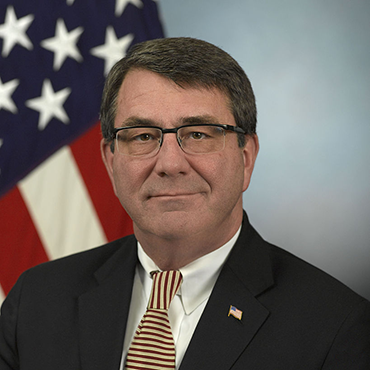Rewiring the Pentagon: Carter's new cyber strategy
After two months on the job studying DOD's cybersecurity and IT needs, Secretary Ashton Carter is set to unveil a new Pentagon cyber strategy in Silicon Valley.

Defense Secretary Ashton Carter will unveil the Pentagon's cyber strategy on April 23.
SAN FRANCISCO -- After two months on the job studying the Defense Department's cybersecurity and defense IT needs, Secretary Ashton Carter will on April 23 unveil a new DOD cyber strategy that emphasizes developing the personnel and technologies necessary to stay abreast of an ever-evolving threat.
The strategy seeks to accelerate cyber-related R&D at the Pentagon, calls for an assessment of the DOD cyber mission force's ability to deal with multiple threats, and fleshes out the department’s deterrence doctrine.
Critically, the strategy offers guidance on building out a workforce at Cyber Command that will reach 6,200 people, but which is only about halfway there. The strategy will provide "clear guidance" for that workforce development, according to a Pentagon summary of the strategy that did not go into detail on the subject.
Carter's strategy is broad, covering everything from securing the intellectual property of defense contractors to working with the Department of Homeland Security to "develop continuous and automated mechanisms for sharing information," according to the summary.
The strategy also prioritizes building cyber defense among U.S. allies in the Asia-Pacific, Middle East and Europe. How well that capacity-building goes in the Asia-Pacific will in part affect how the Pentagon copes with its stated concerns over Chinese cyber threats.
Dr. Carter goes to Silicon Valley
Carter will be the first sitting Defense secretary to visit Silicon Valley in nearly 20 years, according to defense officials. And the cyber strategy is not the only news up his sleeve.
He also plans to announce the following initiatives:
- A pilot program to tap into startup technologies outside the traditional defense industrial base.
- The creation of the Pentagon’s first full-time outreach office in Silicon Valley, which will be staffed by active-duty and civilian personnel.
- DOD’s intention to make investments through In-Q-Tel, a venture capital organization, in technology such as nano-electronics and automation.
- Establishment of a DOD branch of the U.S. Digital Service, the outfit credited with helping fix Healthcare.Gov. The Pentagon branch of the team will initially focus on improving the interoperability of electronic health records between the DOD and the Veteran Affairs Department, officials said.
Electronic health records could be the first of multiple projects for the Digital Service at the DOD. "There are a host of business system problems that they could address for us," a defense official told reporters.
Carter will on April 23 meet Facebook COO Sheryl Sandberg to "discuss what DOD can learn about Facebook's innovative approaches to managing technical talent, managing a lot of smart people at once," a second defense official told reporters. On April 24, Carter will meet with venture capitalists and corporate executives in an event hosted by Ben Horowitz, a Menlo Park, Calif., venture capitalist.
Carter's trip reflects a realization at the Pentagon that much of the innovation in IT happens outside the defense industrial base. More and more of such dynamic technologies "reside in small businesses and start-ups, not just blue chip corporate laboratories," the first defense official said.





